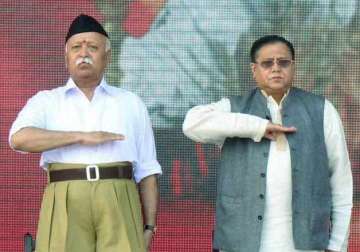Nagpur: Amid incidents like Dadri lynching sparking outrage in cultural sphere and several writers returning awards, Niti Ayog member Vijay Saraswat, sharing the RSS platform, today said India could offer to the world its cultural tolerance.
"India can offer to world its cultural tolerance and the ideal of life dedicated to duty," said Saraswat, who was the chief guest at the annual RSS Dussehra rally here.
He said that "Bharatiyata" (Indianess) sees life in an integrated manner as conspetualised by the late Jan Sangh ideologue Deen Dayal Upadhyaya.
"Deen Dayal Upadhyaya conceptualised Bharatiyata, which means culture, which unlike western thoughts sees life as an integrated whole," the former DRDO chief said.
Dwelling on development issues, he said the building block of the country's transformation is "empowerment of masses from poverty through strong imperatives for jobs, growth and effective basic services," he said.
He said the country's human development indicators suggest more widespread deprivation in terms of quality of life and access to basic service.
About 680 million Indians cannot meet their essential needs, 50 per cent of public spending on basic services does not reach the people, 46 per cent of basic services are not within reach of the average household, he highlighted.
About 580 million people can be economically empowered by 2022, he said.
On requirements over the next decade, the Niti Ayog member said 115 million additional non-farm jobs are needed over next 10 years, 70 per cent increase needed in agricultural yields, 50 per cent of public social spending is needed for health care, water and sanitation, up from 20 per cent today.
Referring to the Empowerment Line, a new measure of the consumption required for an average Indian to fulfil eight basic needs: food, energy, housing, drinking water, sanitation, healthcare, education, and social security, he said 2,100 (urban) or 2,400 (rural) calories consumption, including 60 grams protein and 40 grams fat per capita per day are needed.
He also emphasised on access to clean cooking fuel and electricity, acceptable housing, proper piped water supply, proper sanitary latrines in rural households and underground sewerage with waste water treatment in urban households are required, he said.
Since majority of our population lives in villages and life support system is agri-based, we need to concentrate on agriculture for crossing the empowerment line, he said.
Latest India News
